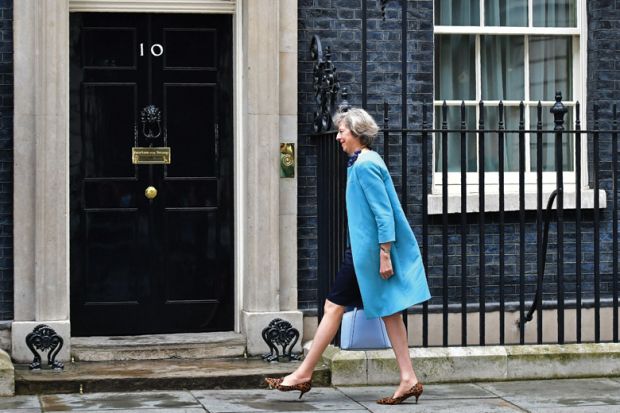Theresa May will acknowledge that the goal of widening access to English universities “is not made easier” by a funding system that leaves students from the poorest households with the highest levels of debt, as she launches a review of post-18 funding in the country.
In a speech in Derbyshire on 19 February, the prime minister will warn that England now has “one of the most expensive systems of university tuition in the world”, after the Conservative-led coalition’s decision to raise the tuition fee cap in 2012.
She will indicate that she now shares the concerns of students and their families about aspects of the current finance arrangements. According to modelling conducted by the Institute for Fiscal Studies, the last Conservative government’s decision to abolish maintenance grants for the poorest students in 2016, replacing such funding with loans, means that students from the poorest 40 per cent of families graduate with debts of about £57,000 on average, compared with around £43,000 for students from the richest 30 per cent of families.
In excerpts from the speech released in advance, Ms May says that the goal of making university study accessible to young people from every background “is not made easier by a funding system which leaves students from the lowest-income households bearing the highest levels of debt, with many graduates left questioning the return they get for their investment”.
The review, she will say, “will examine how we can give people from disadvantaged backgrounds an equal chance to succeed. That includes how disadvantaged students and learners receive maintenance support, both from government and universities and colleges.”
One option that the review could consider is the reintroduction of maintenance grants. It could also look at reducing tuition fees, changing the interest rate on student loans, or adjusting the length of time graduates are expected to make repayments for.
In the speech, Ms May will confirm that she shares concerns expressed by education secretary Damian Hinds about how most university courses cost around the maximum fee of £9,250 and about the continuing dominance of the three-year, full-time degree model.
This has triggered suggestions that universities could be made to reduce fees for arts and social sciences degrees that offer lower graduate earnings.
“The competitive market between universities which the system of variable tuition fees envisaged has simply not emerged,” Ms May will say. “All but a handful of universities charge the maximum possible fees for undergraduate courses. Three-year courses remain the norm. And the level of fees charged [does] not relate to the cost or quality of the course.
“We now have one of the most expensive systems of university tuition in the world.”
The creation of the review reflects Conservative concern over the success among young voters of Labour’s pledge to abolish tuition fees.
The review, Ms May will confirm, will be led by the government, “supported” by an independent chair and panel. It is expected to conclude in “early 2019”, but will publish an interim report in the meantime.
Ms May will also call on people to “throw away” the “outdated attitude” that university is the only desirable route for young people and that going into vocational training “is something for other people’s children”, and she will call on the review to “[break] down false boundaries between further and higher education”.
Dame Janet Beer, the president of Universities UK and vice-chancellor of the University of Liverpool, warned about the potential impact of changes to the funding system.
“Our universities are world renowned for quality, transforming students’ lives and developing the skilled graduates our economy needs,” she said. “Future success depends on universities having stable and sustainable funding – which the current system provides.”
However, Dame Janet said that the review offered an opportunity “to examine the evidence and to make improvements”.
“Crucially, the current system could be better understood and feel fairer to students,” she said. “Injecting new investment to help the poorest students with their living costs and tackling the decline in mature and part-time study must be priorities.”
Register to continue
Why register?
- Registration is free and only takes a moment
- Once registered, you can read 3 articles a month
- Sign up for our newsletter
Subscribe
Or subscribe for unlimited access to:
- Unlimited access to news, views, insights & reviews
- Digital editions
- Digital access to THE’s university and college rankings analysis
Already registered or a current subscriber? Login








